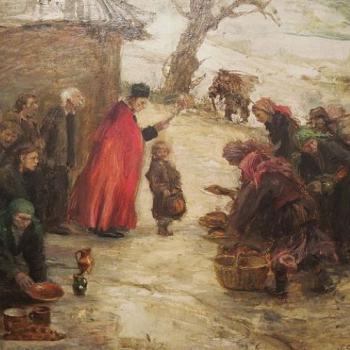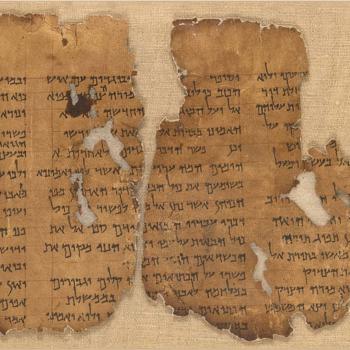This is the fourth reflection in our Advent Series, "The Hopes and Fears of All the Years," by biblical scholars and preachers John C. Holbert and Alyce McKenzie. For an overview of the series with links to all the reflections, click here.
Fourth Sunday in Advent
Isaiah 7:10-16
It seems unimaginable that anything new could be said about this passage from Isaiah. It has played such a huge role in the evolving theology and faith convictions of the Christian community. This has been so since some in the earliest community of Christians appropriated Isaiah’s words as prefiguring the miraculous birth of Jesus. Indeed, in some modern communities of faith this belief in the virginal conception of Jesus has become nothing less than a litmus test of correct belief, and those who do not so believe are excluded from that community. It is always useful to reiterate what happened to make this belief important for some. It is in this case a problem of linguistic ambiguities.
Isaiah announces in 7:14 that God will give Ahaz, king of Judah, a sign. Ahaz has piously refused to ask for a sign from God, but it seems clear that his refusal has less to do with piety than with fear, fear of the kings of Israel and Aram who are anxious that Ahaz join them in an axis against the gathering might of the Assyrians. Isaiah warns Ahaz that such an alliance will be doomed, because both Aram and Israel, the northern kingdom, are soon to be destroyed by those same Assyrians. It turns out that the prophet is quite right, though the complete destruction is delayed until 721 B.C.E. (perhaps a decade after the prophecy), when the northern kingdom of Israel is wiped off the map.
But the sign that Isaiah proposes to give to the reluctant Ahaz is that “the young woman is with child and shall bear a son, and (she) shall call his name Emmanuel.” We will say more of this below, but the linguistic point now is that the text says “the young woman.” This woman is known by the prophet, hence the definite article that designates her, and she is called in Hebrew ‘almah. Several hundred years later, when Greek became the language of the known world, made so by the great conquests of Alexander late in the fourth century B.C.E., it became necessary to translate the Hebrew Bible into Greek in order that the many Greek readers could have access to it. This translation was called the Septuagint, based on the Greek number 70, because the myth developed that 70 translators went into 70 different rooms and came forth with precisely the same translation! Anyone who has translated anything from one language to another knows all too well how improbable such a myth is! But in the Greek version of Isaiah 7:14, the Hebrew ‘almah was translated as parthenos, a word often, but not always, meaning in Greek “virgin.” Hebrew ‘almah never means virgin; that word in Hebrew is bethulah. It is certain that Isaiah’s image of the young woman had nothing to do with her virginal status. However, both Matthew and Luke (although not Mark and John), readers of the Greek Old Testament, read parthenos at Isaiah 7:14 and proclaimed that Jesus was born of the virgin Mary.
It is not my intent in this rehearsal of the linguistic facts of this famous problem to argue that one ought or ought not to believe in Jesus’ virgin birth. It is important, however, to hear what Isaiah was trying to say to Ahaz, the waffling king of Judah, with his sign of Emmanuel. Perhaps that may help us deepen our understanding of the value of this oracle for the early community of Christians. Emmanuel means “God is with us,” a clear statement that God has not left Ahaz on his own to struggle with the fiery war-like designs of Pekah and Rezin, kings of Israel and Aram.
This boy, Emmanuel, says the prophet, will eat “curds and honey,” non-solid food fit for babies. The next word in verse 15 has been the subject of enormous scholarly debate. NRSV translates that Emmanuel will eat this food “by the time he knows how to refuse the evil and choose the good.” I admit to being able to make little sense of that reading. It strikes me that the word might better be read “until,” hence he will eat this food “until he knows how to refuse evil and choose good.” Assuming that designation means that he will eat soft baby food until he can gain some sense of moral discernment (3 or 4 years old?), before that time, says the prophet, both Aram and Israel will be deserted lands. The visitation of God will be as swift and terrible as the days when “Ephraim departed from Judah,” that is 922 B.C.E. when Solomon’s kingdom divided into northern Israel and southern Judah.





